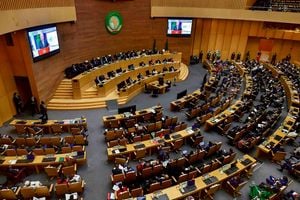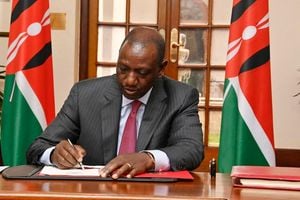
The National Treasury Building in Nairobi.
Mooted several years earlier, the treasury single account idea was written into the PFM Act in 2012. When the Jubilee administration came to town one year later, it became a mantra. That, and the now forgotten, single source of truth.
The single source of truth was the idea of digitizing all registries, and then linking all property registries such as companies, lands, and vehicles, with the registries of persons, births and deaths, passports, driving licenses and so on.
You could then get all the Know Your Customer (KYC) type information from the one single source, particularly if the database would have geographical information such as street addresses.
It sounded nice and modern. Who wants to comb through dusty files in equally dusty government offices in multiple places? And some offices were outright health hazards. In Laikipia, land parcel files were in sacks, in snake infested unit huts in Nanyuki. Fortunately, the County renovated a nearby building and bought the appropriate filing system.
The single source of truth was music to the ears of anti-corruption warriors. Wealth declaration forms would be irrelevant since you could tell who owns what in an instant. Unfortunately, after about 24 months of lots of talk and high-level meetings chaired by presidential advisors, the single source of truth was quietly shelved. The political elite must have figured out that if you can easily track the increases in their assets, you can tell who was being corrupt! And they couldn’t have that now, could they?
A treasury single account, to be used by all national government entities is frankly, pie in the sky. The PFM Act is 12 years old. Why has the treasury single account not materialized in that period? Supporters of the idea point to the huge amount of cash balances in the tens of thousands of bank accounts belonging to national government entities. They theorise that if that cash was managed centrally, there would be no need for government to borrow every week.
The more cautious lot point out that the treasury single account contemplated in the laws is a much narrower one than is being promoted, and that it opens the door for even worse mischief - craw back and misdirection of monies already drawn from the consolidated fund.
The TSA is attractive, and causes salivating by those at the top of cash flow management in the national government. However, the expanded version is practically and legally difficult, perhaps impossible to do. Here is why.
First, recent reports that Treasury PS has required that “as part of the implementation process, the National Treasury update(s) the record of all the bank accounts held by public entities, at National and County Government levels, pursuant to Section 28 (6) of the PFM Act 2012 must be exaggerated. Section 28 refers to banking arrangements for national government entities. Counties are not such entities. Since the National Treasury and County Governments know that, such a demand, if it exists, will certainly be ignored by counties.
Second, it is doubtful that security agencies would want us to know their bank balances. Are KDF, NSIS, and the National Police Service national government entities or independent arms of the security infrastructure, created by the Constitution? If the latter, like Counties, they too may choose to ignore such as demand.
Third, the Judiciary is clearly an independent constitutional organ. Of course, some ill-informed citizens like to call it an arm of government. I rather think of it as an arm of the State. If it is an arm of the national government, then the National Treasury will rightfully argue that they must promptly provide the details of all their bank accounts.
The Judiciary can expect that those accounts will become linked to the Treasury Single Account, if it ever takes off. If Judiciary is not a national government entity then, they too, like Counties, may choose to ignore this administrative order.
Fourth, Section 28 of the PFM does not give the National Treasury authority over cash flow management! Rather it deals with banking arrangements for receipt of revenues by national government entities. It also anticipates that payments to or on behalf of national government entities shall be made from the Treasury Single Account.
It appears to be talking about appropriations in aid - that is, monies the citizens pay for direct services such as renewing your driver’s license. A lot of these monies are currently being paid using mobile money, with the services themselves placed on the e-citizen platform. Controversially, using the platform attracts a convenience fee, which goes to the owner of the platform, a private company.
Section 28 (7) requires the National Treasury to submit monthly statements on the actual revenue collected in the treasury single account to the Commission for Revenue Allocation (CRA). Presumably, this gives CRA a more complete picture when determining nationally raised revenues for purposes of their main job – division of revenue.
Cash flow management for the national government level is dealt with at Section 29 of the PFM. Of note, State Corporations are exempt - further proof that the lawful TSA refers to ministerial appropriations in aid and disbursements of monies that have left the consolidated fund, but are yet to be paid out to the final payees.
Such monies have already been signed off by the Controller of Budget. If they can be intercepted and redirected under the guise of centrally managed cash flow, national government finances will be worse not better, and many contractors will never be paid!
Kenya Kwanza political heavies and their advisors are busy, as they move from one important meeting to the next, or when they are in the country between crucial international engagements, aimed no doubt, at “increasing foreign direct investments” (sic).
As such they have little time to read, or attend to pesky little details of law and common sense. Cabinet has come to the rescue, directing for the fifth time in twelve years, implementation of the TSA.
@NdirituMuriithi is an economist










